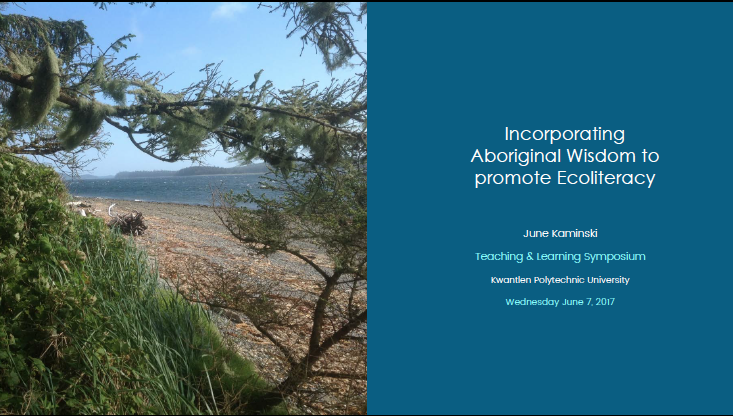First Nations Pedagogy Blog News, Announcements, Ideas
Incorporating Aboriginal Wisdom to promote Ecoliteracy Conference Presentation02 Oct, 2017 | Posted by: june
Presented at Teaching & Learning Symposium, Kwantlen Polytechnic University, June 7, 2017
Abstract
Ecological sustainability is a goal of many Canadian organizations and professionals, including educators and students. The most logical source of sustainability wisdom that promotes ecological wholeness is traditional Aboriginal teachings and philosophies. Nursing educational programs are beginning to incorporate Aboriginal wisdom into curriculum to promote holistic nursing care of First Nations, Metis and Inuit people and to help evolve ecoliteracy. Nursing faculty follow a mandate to teach students to be active agents of advocacy for global issues including environmental health and ecology.
This presentation addressed how students create content to help nurses explore ecological issues and engage in the process of finding solutions to critical issues, and how Aboriginal wisdom supports this. It also explored how the Canadian Nurses for Health and the Environment encourages all Canadian nurses to become involved in promoting ecological sustainability on a national level.
The presentation supports the notion that all human beings must develop ecoliteracy if we are to preserve our earthly home. This requires both thought and definitive action to avert planetary crises and to preserve our environment for future generations.
VIEW THE PRESENTATION
Incorporating Aboriginal Wisdom to Promote Ecoliteracy 07 Apr, 2016 | Posted by: june
Ecological sustainability is a goal of many Canadian organizations and professionals, including nurses. The most logical source of sustainability wisdom that promotes ecological wholeness are traditional Aboriginal teachings and philosophies. Nursing educational programs are beginning to incorporate Aboriginal wisdom into curriculum to promote holistic nursing care of First Nations, Metis and Inuit people and to help evolve ecoliteracy. Nursing faculty follow a mandate to teach students to be active agents of advocacy for global issues including environmental health and ecology.
This Pechakucha by June Kaminski addresss how students create content to help nurses explore ecological issues and engage in the process of finding solutions to critical issues, and how Aboriginal wisdom supports this. It also explores how the Canadian Nurses for Health of the Environment encourages all Canadian nurses to become involved in promoting ecological sustainability on a national level.
Special Issue: Climate Change and Indigenous Peoples in the United States: Impacts, Experiences and Actions03 Nov, 2013 | Posted by: june

Indigenous Perspectives Fill Entire October Issue of Peer-Reviewed Climate-Change Journal
Read more at http://indiancountrytodaymedianetwork.com/2013/10/30/indigenous-perspectives-fill-entire-october-issue-peer-reviewed-climate-change-journal
Direct link to Journal: http://link.springer.com/journal/10584/120/3/page/1
